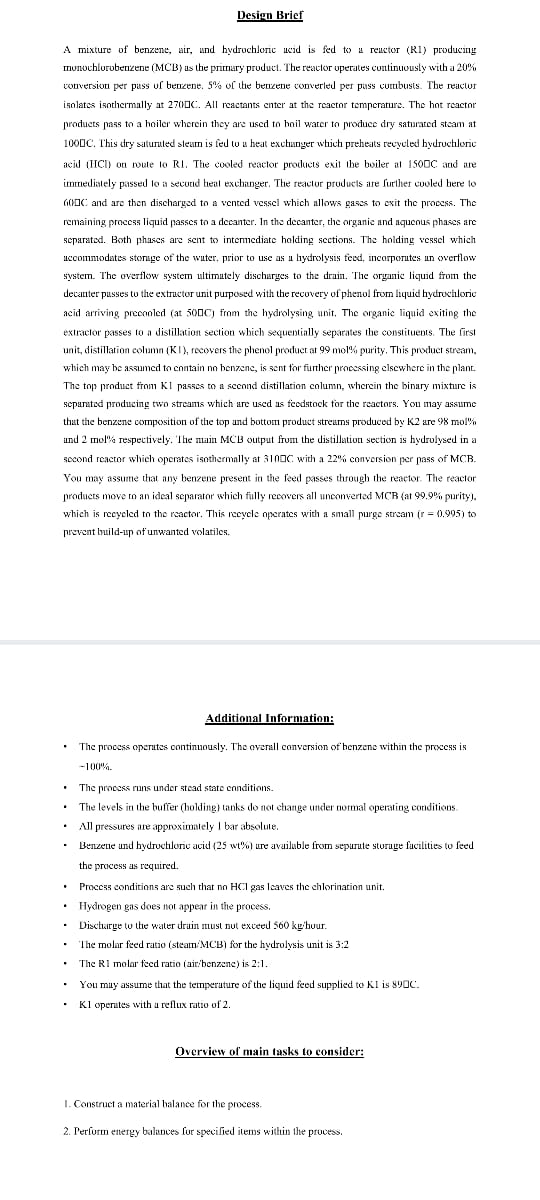Answered step by step
Verified Expert Solution
Question
1 Approved Answer
A mixture of benzene, air, and hydrochlonc usid is fed to a reustor ( R 1 ) producing munochlorobenzene ( MCB ) as the primary
A mixture of benzene, air, and hydrochlonc usid is fed to a reustor R producing
munochlorobenzene MCB as the primary product. The reactor operates continuously with a
wonersion per pass of berzene, of the berzene converled per pass combusts. The reactur
isolates isothermally at All reactants enter at the reactor temperature. The hot reactor
products pass to a hoiler wherein they are used to boil water to produce dry saturated steam at
C This dry saturuled sleam is fed to a heat exchanger which preheats recycled hydructloric
acid HC on roate to RI The cooled reactor products exil the boiler at C and are
immediately passed to a second heal exchinger. The reactor products are further cooled bere to
fivac: and are then discharged to a vented vessel which allows gases to exit the process. The
remaining process liquid passes to a decanter. In the decanter, the organie and aquenus phases are
separated. Both phases are sent to intennediate holding sections. The holding vessel which
uccomnodates stonge of the wuter, prior to use as a hydrolysis fexd, mcorponutes un overflow
system. The overflow system ultimutely discharges to the drain. The organic liquid from the
decanter pusses to the extructor unit purposed with the recovery of phenol from hquid hydrochloric
acid arriving preconled at from the hydrolysing unit. The organic liquid exiting the
extractor passes to a distillation section which sequentially separates the constituents. The first
unit, distillarion column fecovers the phenol product at mol purity. This product stream,
which may be assumed to contain no benzene, is sent for funther proessing elsewhere in the plane.
The top product from passes to a scend distillation column, wherein the binary mixture is
separated producing two streams which are used as feedstock for the reactors. You may assume
that the benzene composition of the top and bottom product streums produced by are mol
and respectively. The main output from the distillation section is hydrolysed in a
second reactor which operates isothermally at with a conversion per pass of MCB
You may assume that any benzene present in the feed passes through the reactor. The reactor
products move to an ideal separator which fully recovers all unconverted MCR at purity
which is recyeled to the reactor. This recycle nperates with a small purge stream to
prevent buildup of unwanted volatiles.
Additional Information:
The process operates continuously. The overall conversion of benzene within the process is
The process runs under stead state conditions.
The levels in the buffer holding tanks do not ctange under normal operating conditions.
All pressures are approximaly I bar absolute
Berzene und hydroctlonic acid wt ure availuble from sepurute storage facilities to feed
the process as required.
Process conditions are such that no HCl gas leaves the chlorination unit.
Hydrogen gas does not appeat in the process.
Discharge to the water drain must nut exceed kgh hour.
The molar feed ratio steam MCB for the hydrolysis unit is :
The molar fied ratio airbenzene is :
You mily assume that the temperature of the licund feed supplied to KI is $
K opentes with a reflux ratio of
Overview of main tasks to consider:
Construct a material balance for the process.
Perform entergy balances fur specilied items within the process.

Step by Step Solution
There are 3 Steps involved in it
Step: 1

Get Instant Access to Expert-Tailored Solutions
See step-by-step solutions with expert insights and AI powered tools for academic success
Step: 2

Step: 3

Ace Your Homework with AI
Get the answers you need in no time with our AI-driven, step-by-step assistance
Get Started


